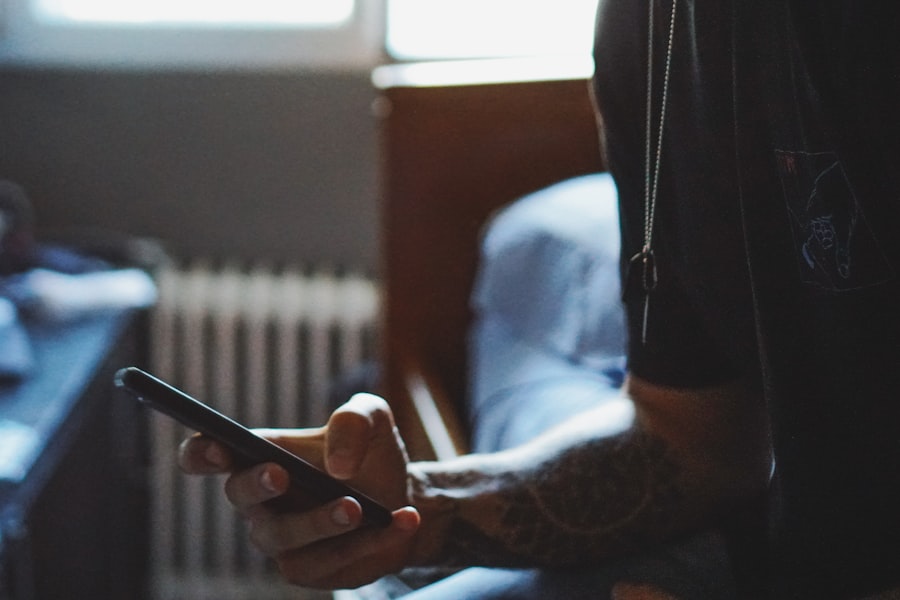You may have noticed that your daily routine often revolves around your smartphone or computer, with social media platforms taking center stage. One of the first signs of social media addiction is the compulsive need to check notifications or updates, even when you have other responsibilities or activities waiting for your attention. You might find yourself scrolling through feeds during meals, conversations, or even while driving, which can be a clear indication that your relationship with social media has become unhealthy.
If you feel anxious or irritable when you are unable to access your accounts, it’s time to take a step back and evaluate your habits. Another sign to watch for is the amount of time you spend on social media compared to other activities. If you often lose track of time while scrolling through posts or watching videos, it may be a signal that your usage has crossed into the realm of addiction.
You might also notice that social media is affecting your sleep patterns, as late-night scrolling can disrupt your ability to wind down and get adequate rest. Recognizing these signs is the first step toward addressing the issue and reclaiming control over your time and mental well-being.
Key Takeaways
- Recognizing the Problem: Signs of Social Media Addiction
- Constantly checking social media, even in inappropriate or dangerous situations
- Feeling anxious or irritable when unable to access social media
- Neglecting responsibilities and relationships due to excessive social media use
- Understanding the Impact: How Social Media Addiction Affects Mental Health
- Increased risk of depression, anxiety, and low self-esteem
- Disrupted sleep patterns and decreased productivity
- Comparison and FOMO (fear of missing out) leading to negative emotions
- Setting Boundaries: Creating a Healthy Relationship with Social Media
- Limiting daily screen time and setting specific usage hours
- Unfollowing accounts that trigger negative emotions or unhealthy behaviors
- Engaging in offline activities and hobbies to reduce reliance on social media
- Finding Support: Seeking Help from Friends, Family, or Professionals
- Talking openly with loved ones about struggles with social media addiction
- Seeking professional help from therapists or support groups
- Building a strong support network to provide encouragement and accountability
- Practicing Mindfulness: Being Present in the Moment and Limiting Screen Time
- Engaging in mindfulness practices to reduce impulsivity and increase self-awareness
- Setting reminders to take breaks and be present in the real world
- Using screen time tracking apps to monitor and limit social media usage
Understanding the Impact: How Social Media Addiction Affects Mental Health
The impact of social media addiction on mental health can be profound and far-reaching. You may find that excessive use leads to feelings of anxiety, depression, or loneliness. The constant comparison to others’ curated lives can create unrealistic expectations and foster feelings of inadequacy.
You might scroll through images of friends enjoying vacations or achieving milestones, only to feel a sense of envy or dissatisfaction with your own life. This cycle can perpetuate negative self-esteem and contribute to a distorted self-image. Moreover, social media can create a false sense of connection while simultaneously isolating you from real-life interactions.
You may feel more comfortable communicating through screens rather than engaging in face-to-face conversations, which can lead to a decline in social skills and emotional intelligence. The dopamine rush from likes and comments can become addictive, making it difficult for you to find fulfillment in genuine relationships and experiences outside the digital realm. Understanding these impacts is crucial for recognizing the need for change.
Setting Boundaries: Creating a Healthy Relationship with Social Media

Establishing boundaries is essential for cultivating a healthier relationship with social media. You might start by setting specific times during the day when you allow yourself to check your accounts, rather than indulging in spontaneous scrolling throughout the day. For instance, designating certain hours in the morning and evening can help you maintain control over your usage while still staying connected.
This structured approach allows you to enjoy social media without letting it dominate your life. In addition to time limits, consider curating your social media feeds to include only accounts that inspire and uplift you. Unfollowing or muting accounts that trigger negative feelings can create a more positive online environment.
By taking these steps, you can create a more intentional and balanced approach to social media that prioritizes your mental well-being.
Finding Support: Seeking Help from Friends, Family, or Professionals
| Support Type | Benefits | Challenges |
|---|---|---|
| Friends | Emotional understanding, empathy | Limited expertise |
| Family | Unconditional love, familiarity | Potential conflicts, biases |
| Professionals | Expertise, confidentiality | Cost, time commitment |
When grappling with social media addiction, seeking support from friends and family can be invaluable. You might find it helpful to share your struggles with someone you trust, as they can provide encouragement and hold you accountable for your goals. Engaging in open conversations about your experiences can foster understanding and strengthen your relationships, allowing you to feel less isolated in your journey toward recovery.
If you find that self-help strategies are not enough, consider reaching out to a mental health professional who specializes in addiction or behavioral issues. They can offer tailored guidance and coping strategies to help you navigate your relationship with social media more effectively. Therapy can provide a safe space for you to explore underlying issues contributing to your addiction and develop healthier habits moving forward.
Practicing Mindfulness: Being Present in the Moment and Limiting Screen Time
Incorporating mindfulness into your daily routine can significantly enhance your ability to manage social media use. You might start by setting aside time each day for mindfulness practices such as meditation or deep breathing exercises. These techniques can help ground you in the present moment and reduce the urge to reach for your phone during moments of boredom or stress.
By cultivating awareness of your thoughts and feelings, you can better understand the triggers that lead to excessive social media use. Additionally, consider implementing “screen-free” zones or times in your life. For example, you might designate mealtimes or family gatherings as moments where phones are put away, allowing for genuine connection and engagement with those around you.
By consciously limiting screen time and focusing on the present, you can foster deeper relationships and enhance your overall well-being.
Engaging in Alternative Activities: Finding Hobbies and Interests Outside of Social Media

To break free from the cycle of social media addiction, it’s essential to explore alternative activities that bring you joy and fulfillment. You might consider picking up a new hobby or revisiting an old one that has fallen by the wayside. Whether it’s painting, gardening, hiking, or playing a musical instrument, engaging in creative pursuits can provide a sense of accomplishment and satisfaction that social media often lacks.
Additionally, participating in group activities or classes can help you connect with others who share similar interests while reducing reliance on digital platforms for social interaction. You may find that immersing yourself in these activities not only enriches your life but also helps fill the void left by reduced social media use. By discovering new passions, you can create a more balanced lifestyle that prioritizes real-world experiences over virtual ones.
Reflecting on Triggers: Identifying What Causes Excessive Social Media Use
Understanding what triggers your excessive social media use is crucial for making lasting changes. You might take some time to reflect on specific situations or emotions that lead you to reach for your phone. For instance, do you find yourself scrolling when you’re bored, anxious, or feeling lonely?
Identifying these patterns can empower you to develop healthier coping mechanisms when faced with similar feelings in the future. Once you’ve pinpointed your triggers, consider creating a plan for how to respond when they arise. Instead of defaulting to social media as a distraction, you might choose to engage in an alternative activity or reach out to a friend for support.
By proactively addressing these triggers, you can break the cycle of addiction and cultivate a more mindful approach to technology use.
Developing a Routine: Establishing a Balanced Schedule without Social Media Overuse
Creating a balanced daily routine is essential for managing social media use effectively. You might start by mapping out your day and identifying specific blocks of time dedicated to work, leisure, exercise, and social interactions—both online and offline. By structuring your day intentionally, you can ensure that social media does not overshadow other important aspects of your life.
Incorporating regular breaks from screens throughout the day can also help maintain balance. For example, consider scheduling short walks or stretches during work hours to refresh your mind and body. These breaks not only reduce screen time but also promote physical well-being and mental clarity.
By establishing a routine that prioritizes diverse activities, you can create a healthier relationship with social media.
Embracing Offline Connections: Nurturing Relationships in the Real World
While social media can facilitate connections with others, it’s essential not to overlook the importance of nurturing relationships in the real world. You might make an effort to spend more time with friends and family in person, whether through casual meetups or planned outings. Engaging in face-to-face interactions allows for deeper connections and fosters emotional intimacy that online communication often lacks.
Consider joining local clubs or community groups that align with your interests as another way to build offline connections. These opportunities not only provide a sense of belonging but also encourage meaningful interactions with others who share similar passions. By prioritizing real-world relationships over virtual ones, you can cultivate a support system that enhances your overall well-being.
Celebrating Progress: Acknowledging and Rewarding Steps Towards Recovery
As you work toward overcoming social media addiction, it’s important to celebrate your progress along the way. You might set small goals for yourself—such as reducing screen time by a certain percentage each week—and acknowledge when you achieve them. Rewarding yourself for these accomplishments can reinforce positive behavior and motivate you to continue on your journey toward recovery.
Celebration doesn’t have to be extravagant; even small gestures like treating yourself to a favorite snack or taking time for self-care can serve as meaningful rewards. By recognizing your efforts and progress, you’ll cultivate a sense of accomplishment that encourages further growth and reinforces your commitment to maintaining a healthier relationship with social media.
Maintaining Long-Term Success: Strategies for Sustaining a Healthy Relationship with Social Media
Achieving long-term success in managing social media use requires ongoing commitment and self-awareness. You might consider regularly reassessing your relationship with social media by reflecting on how it impacts your mental health and overall well-being. Periodic check-ins can help you identify any emerging patterns or triggers that may require adjustment in your approach.
Additionally, staying informed about the potential effects of social media on mental health can empower you to make conscious choices about its use in your life. Engaging in discussions with friends or support groups about shared experiences can also provide valuable insights and encouragement as you navigate this journey together. By remaining proactive and mindful about your relationship with social media, you can sustain a balanced lifestyle that prioritizes both online engagement and real-world connections.
In recent years, the pervasive influence of social media has led to a growing concern about its addictive nature and the need for effective recovery strategies. Many individuals find themselves spending excessive amounts of time on platforms, which can negatively impact their mental health and personal relationships.
This article delves into practical steps and therapeutic approaches to help individuals regain control over their digital habits. To learn more about these strategies, you can visit the article by clicking on this link.
WATCH THIS! Your Brain Is Not Bored; AI Is Stealing Your Dopamine (76-Minute Documentary)
FAQs
What is social media addiction recovery?
Social media addiction recovery refers to the process of overcoming an unhealthy dependence on social media platforms. It involves recognizing the negative impact of excessive social media use and taking steps to regain control over one’s online behavior.
What are the signs of social media addiction?
Signs of social media addiction may include spending excessive amounts of time on social media, feeling anxious or irritable when unable to access social media, neglecting responsibilities in favor of using social media, and experiencing negative effects on mental health and relationships.
What are the steps to recover from social media addiction?
Recovering from social media addiction typically involves setting boundaries for social media use, seeking support from friends, family, or professionals, finding alternative activities to replace excessive social media use, and practicing mindfulness and self-care.
How can social media addiction recovery benefit individuals?
Recovering from social media addiction can benefit individuals by improving their mental and emotional well-being, enhancing their relationships and productivity, and allowing them to regain a sense of control and balance in their lives.
Are there professional resources available for social media addiction recovery?
Yes, there are professional resources available for social media addiction recovery, including therapists, support groups, and online programs specifically designed to help individuals overcome their dependence on social media.




